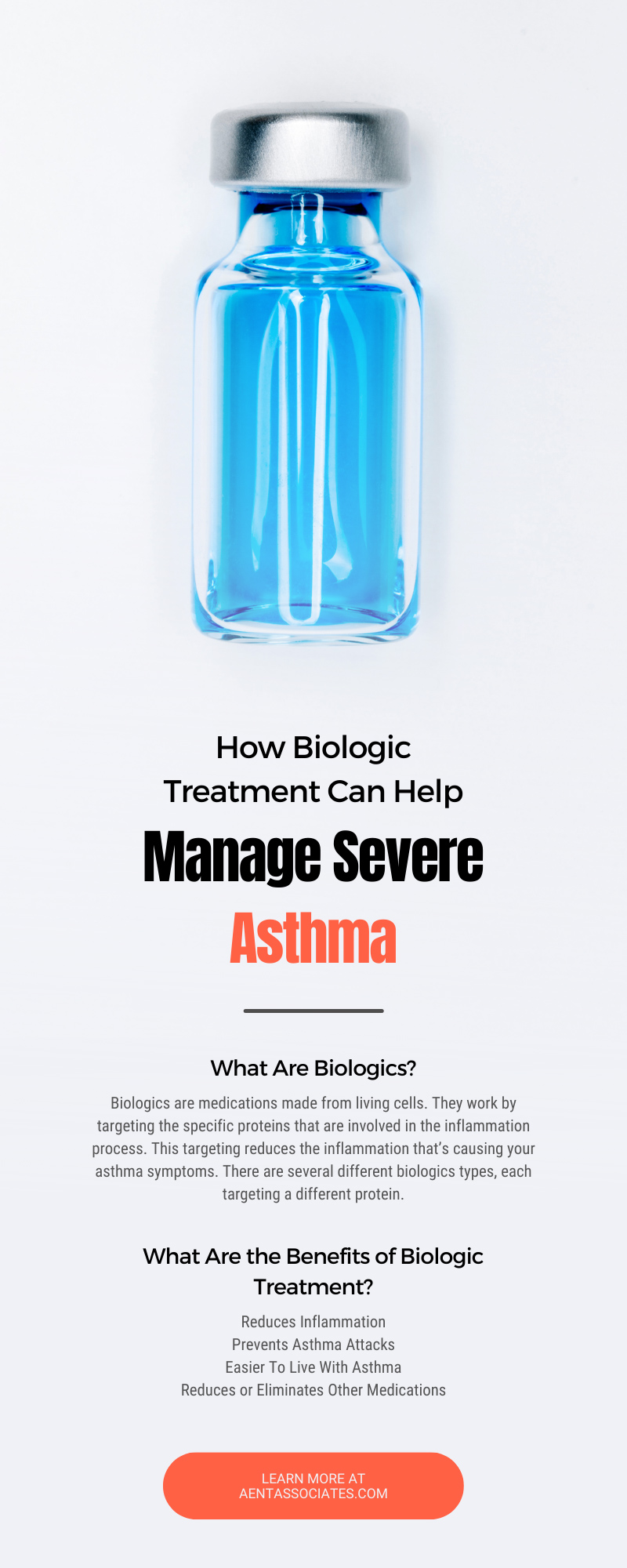
Asthma is a chronic lung disease that causes wheezing, shortness of breath, chest tightness, and coughing. Other symptoms include inflammation and mucus production in the airways. Asthma can be mild, moderate, or severe. People with severe asthma have symptoms more often and are more likely to experience attacks. Severe asthma can also make it hard for one to do everyday activities such as walking, talking, or sleeping. These attacks can seem unpredictable and frightening. You may worry about not being able to breathe, or you may feel as though you’re suffocating.
Luckily, there’s something that can help. Let’s look at biologic treatments and how they can help you manage severe asthma.
What Long-Term Asthma Can Mean for You
If you have asthma, managing your condition to be able to live a healthy, active life is essential. But for some people with asthma, symptoms can be more severe. The latter case is called long-term or persistent asthma. Symptoms of long-term asthma can significantly interfere with daily activities, including work, school, and exercise. Asthma flare-ups can also be more frequent and severe, and they may even require emergency care.
If you have long-term asthma, you’re not alone. It’s estimated that more than 25 million people in the United States have asthma, and about half of these people have long-term asthma.
Symptoms of Asthma
The symptoms of asthma can vary from person to person. Some people have only occasional symptoms, while others may have symptoms all the time. The most common symptoms of asthma include:
- Wheezing
- Shortness of breath
- Chest tightness
- Coughing
- Trouble sleeping
If you have any of these symptoms, seeing a doctor so that they can diagnose your condition and develop a treatment plan is essential.
Asthma Attacks
Asthma attacks can occur when symptoms become worse. During an asthma attack, you may experience:
- Intense wheezing
- Shortness of breath
- Difficulty talking
- Rapid breathing
- Chest pain or tightness
- Pale or blue skin color
- Sweating
- Anxiety or panic
If you have an asthma attack, you must seek medical help immediately. Asthma attacks can be dangerous and even life threatening.
Triggers
Many different things can trigger asthma symptoms. These triggers can vary from person to person, but some common ones include:
- Allergens: Things such as dust, pollen, and pet dander can trigger asthma symptoms.
- Irritants: Factors such as smoke, air pollution, and strong smells can trigger asthma symptoms.
- Exercise: Physical activity can trigger asthma symptoms in some people.
- Cold air: Breathing in cold, dry air can trigger asthma symptoms.
- Medications: Some over-the-counter and prescription medications can trigger asthma symptoms. These include beta blockers, aspirin, and ibuprofen.
- Emotional stress: Stress or anxiety can trigger asthma symptoms in some people.
If you have asthma, knowing your triggers and avoiding them if possible are essential.
What Are Biologics?
Biologics are medications made from living cells. They work by targeting the specific proteins that are involved in the inflammation process. This targeting reduces the inflammation that’s causing your asthma symptoms.
There are several different biologics types, each targeting a different protein. The three main types of biologics used to treat asthma are:
Inhaled corticosteroids (ICS)
ICSs are the most common types of biologic used to treat asthma. They work by reducing the inflammation in your airways. ICSs can reduce airway hyperresponsiveness when your airways narrow in response to triggers such as dust or pollen. This reduction prevents asthma attacks and makes it easier for you to breathe.
Using ICSs early and at the recommended dose can prevent future asthma attacks. ICSs are often doctors’ first choice of therapy for people with mild to moderate persistent asthma.
Leukotriene inhibitors (LTI)
LTIs work by blocking the action of leukotrienes, which are chemicals that cause inflammation in your airways. LTIs can reduce asthma symptoms and improve lung function. They may also prevent asthma attacks altogether.
LTIs are best for people with mild persistent asthma. They work well alone or in combination with ICSs.
Monoclonal antibodies (MAB)
MABs are a newer type of biologic. They work by targeting specific proteins that cause inflammation, which reduces the inflammation in your airways. MABs are usually taken as an infusion, which is a process of slowly injecting the medication into your bloodstream over a period of time. MABs can effectively treat severe asthma, but they may work best with other asthma treatments.
What Are the Benefits of Biologic Treatment?
Biologic treatment can offer many benefits for people with severe asthma. These are some of the specific benefits of biologic treatment:
Reduces Inflammation
As we mentioned, biologics work by targeting specific proteins that are involved in the inflammation process. Therefore, whether or not you’re experiencing a flare-up, biologics can keep the inflammation under control.
Prevents Asthma Attacks
Biologics can also prevent asthma attacks altogether by keeping the inflammation under control. Fewer attacks mean less worry and stress for you and your loved ones.
Easier To Live With Asthma
In general, biologic treatment can make it easier for you to live with asthma. By reducing the symptoms and frequency of your asthma attacks, biologics can help you live a more normal life. You may find that you can do more things you enjoy without having to worry about your asthma.
Reduces or Eliminates Other Medications
Since biologics target the inflammation that’s causing your symptoms, they can also reduce or eliminate the need for other asthma medications. In some cases, you may be able to stop taking your other medications altogether.
Biologic treatment may be a good option for you if you’re among the many people with severe asthma. As medications derived from natural sources, biologics can help you manage your asthma more effectively.
The team at Allergy & ENT Associates is here to help you find the proper biologic medication for you and to provide the support you need to successfully treat your asthma. We offer various biologic options, but we also have a team of experienced, compassionate providers dedicated to helping you live your best life.
Contact us today if you’re ready to explore your biologic treatment options. We look forward to partnering with you on your journey to better health.




